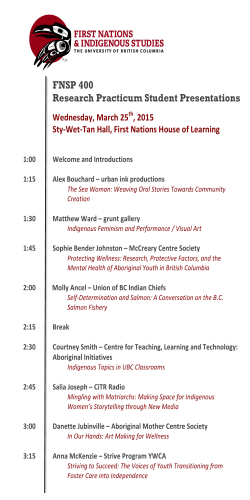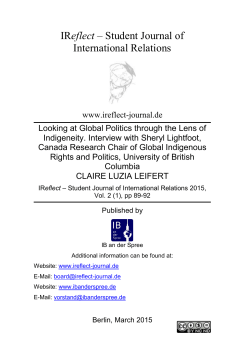
401-003 Indigenous Peoples and Globalization
401-003: Indigenous Peoples and Globalization Marygold Walsh-Dilley ([email protected]) Group: Social & Behavorial Sciences COURSE DESCRIPTION Since the colonial encounter, indigenous peoples have often been seen as doomed – carriers of a traditional culture incongruous with modern society. Globalization, on the other hand, is seen as the spread of western economic and cultural systems – that is, intrinsically modern. The intensification of globalization processes over the past two decades has raised new concerns about the integrity and cultural survival of indigenous peoples, but indigenous groups remain and have become more visible than ever. This seminar undertakes a critical examination of the interplay between indigenous peoples and globalization with a particular focus on Latin America. This requires critical engagement with the key categories of analysis: what do we mean by ‘indigenous’ and ‘globalization’? We will see that how we understand these categories is very important for answering, and critiquing, the question of how globalization impacts indigenous people. This seminar advances the argument that indigenous peoples are not simply passive bystanders to the flows of global social change. Rather, indigenous peoples are active participants in shaping global systems and processes. READINGS Wade, Peter. Race and Ethnicity in Latin America. Niezen, Ronals. The Origins of Indigenism: Human Rights and the Politics of Identity. Bigenho, Michelle. Intimate Distance: Andean Music in Japan. And other journal articles, book chapters, and policy documents such as UN Declaration on Indigenous Rights. STUDENT REQUIREMENTS The key requirement in class is an engaged participation. Students will be responsible for leading discussion, and will work together and with the instructor to design the latter third of the course (themes, readings, activities). Students will also complete regular reading responses and will write a research paper on a topic of their choice. ABOUT THE INSTRUCTOR Marygold Walsh-Dilley is Assistant Professor of Social and Behavioral Sciences in the Honors College. She holds a PhD in Development Sociology from Cornell University, where she also minored in Latin American Studies and American Indian Studies. She has extensive field work experience with Quechua communities in Andean Bolivia. Her research focuses on traditional economic, cultural and social practices of Quechua people and how these practices are utilized, transformed, and performed as these communities increasingly engage with and in global systems and processes.
© Copyright 2026





















